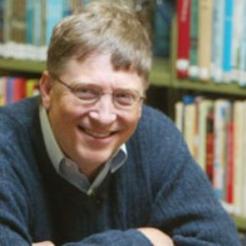Bill Gates has pledged a $750m vote of confidence in the Global Fund to fight Aids, Tuberculosis and Malaria (Global Fund) after it was announced its executive director would step down following the exposure of a "grave abuse of funds" in several countries the fund works in.
Speaking at the World Economic Forum in Davos, Switzerland today, Bill Gates renewed his commitment through the Bill and Melinda Gates Foundation to support the Fund, making a $750m promisory note to the organisation.
The Foundation is the biggest non-government supporter of the Fund, having committed $650m prior and separate to its latest commitment. Gates used his address at the Forum this morning and his annual letter published yesterday to call on governments to keep investing in the Global Fund, saying that the Fund remains "one of the most effective ways we invest our money in every year".
Simon Bland, chair of the Global Fund's board, welcomed the renewed commitment by the Bill and Melinda Gates Foundation: "We thank the Bill & Melinda Gates Foundation for this commitment and we appreciate the trust the Foundation is continuing to show in the Global Fund as well as the strategic vision that has led the Foundation to invest in the Global Fund throughout our ten-year history. Millions of lives depend on a predictable stream of funding from the Global Fund. This promissory note gives the Global Fund the flexibility and authority to distribute funds efficiently based on immediate needs."
Misappropriation of funds
The affirmation of the Foundation's commitment to the Global Fund comes on the Fund's tenth anniversary, and two days after it announced a new leadership structure and the exit of its leader Professor Michel Kazatchkine in March this year.
Kazatchkine has been executive director at the Global Fund for five years but in January 2011, increasing pressure felt over the exposure of the misappropriation of funds in Djibouti, Mali, Mauritania and Zambia - events the Fund says were "well-known incidents that have been reported by the Global Fund and acted on" - forced the Fund to re-evaluate its leadership.
The following September, separate Aids charity the Aids Healthcare Foundation (AHF) called for Kazatchkine to stand down in order to restore faith in the organisation. AHF renewed its call in November and the Global Fund announced it would be appointing a general manager to work alongside Kazatchkine.
New leadership
Commenting on the announcement on Tuesday that the executive director would depart the Fund in March, Michael Weinstein, president of AHF said: "The appointment of new leadership, along with Kazatchkine's departure, is a step in the right direction in restoring confidence in the Global Fund's ability to fight the epidemics it was created to address.
"We hope that new leadership will begin a path toward re-building the Global Fund and reassuring donor countries that funds will be used effectively and responsibly to carry out the urgently-needed, lifesaving mission of the agency," he added.
The new general manager was named in a separate announcement by the Fund on the same day. Gabriel Jaramillo will take up a twelve-month appointment on 1 February. Jaramillo comes with 35 years of experience of the financial sector, having retired a year ago. He has since served as part of the independent panel that looked at the Global Fund's fiduciary controls and oversight mechanisms in the wake of the earlier-stated misappropriations. It made a number of recommended changes to the organisation's risk-management, governance and oversight systems.
Jaramillo said he was 'honoured' by his appointment, which will see him report to the Fund's board. Speaking of his forward-looking strategy, Jaramillo made bold promises of restructure within the Fund: "My priorities at the Global Fund are to achieve maximum efficiency, accountability and concrete results that save lives.
"In essence, we will start with a reorganisation that emphasises simplicity, discipline and rigor, with grant-managemnt as the core activity of the institution."
The Global Fund has provided 3.3 million people in the poorest countries with antiretroviral treatments, detected and treated 8.6 million new cases of tuberculosis and provided 230 million insecticide treated mosquito nets among its many achievements since launching in 2002.
The Fund is supported largely by international government aid spending. The UK provides significant funding and in March 2011, Secretary of State for International Development Andrew Mitchell pledged additional funding after a mulitlateral aid review found the fund had an "excellent track record" for delivering results.









